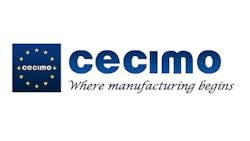EU Machine Tool Builders Want More Active Industrial Policy
CECIMO, the trade association representing machine tool manufacturers across the European Union, weighed into politics recently – congratulating the heads of state and endorsing their recent statement on the necessity of rebuilding the EU’s manufacturing base, but urging more specific and direct action to bring about such a result.
CECIMO is a consortium of 15 national associations of machine tool builders, and represents approximately 1,500 industrial enterprises in the E.U., European Free Trade Assn. (EFTA), and Turkey. It covers more than 97% of total machine tool production in Europe, and more than 33% worldwide.
The group has taken political stances in the past, arguing for coordination among nations to promote workforce development and warning about the prospect of “deindustrialization” if proactive steps are not taken to support the growth of manufacturing in the EU.
Last week the European Summit (a biannual meeting of the European Council, comprising the heads of state of all 28 EU member nations) addressed “industrial competitiveness” for the first time in several decades, taking on a directive by the European Commission (the EU’s cabinet government) to promote “an industrial renaissance.”
The Commission called on the European Council to endorse the EC’s goal of increasing to 20% the manufacturing sector’s contribution to the EU GDP by 2020, and to install a framework for implementing a “consistent and coordinated” European industrial policy.
“CECIMO welcomes the attention given by the EU to the manufacturing industry at the highest political level,” the group’s president, Jean-Camille Uring, stated. “By recognizing the European industrial base as a key driver of economic growth and jobs, the summit conclusions rightly point to manufacturing as the main building block of future European economy.”
Uring also endorsed the European Council’s call for member nations and the EC to prioritize efforts to address STEM (science, technology, engineering and mathematics) skills shortages. “Technological edge is the most important asset for Europe to remain competitive in global markets and it builds on a highly skilled workforce,” Uring stated.
“We are particularly pleased to see that the summit conclusions make a clear reference to key enabling technologies, which includes our industry as provider of advanced manufacturing technologies, being the backbone of industrial competitiveness,” Uring added.
However, CECIMO noted that the Summit statements did not address how the new manufacturing policies should be implemented across the Union. Also, the heads of state failed to commit to the 2020 “reindustrialization” target, “failing to live up to the expectations of industry,” according to CECIMO’s statement.
“It is very positive to see that the European Council sends a clear signal on its intention to make industrial competitiveness a priority across policy areas,” according to Filip Geerts, CECIMO director general. “However, it does not provide clear guidance on how to put it into practice. We do not see how and within which framework policy integration and coordination will be carried out at EU level and between member states.”
“Defining appropriate mechanisms for policy coordination and synchronization will remain an absolute necessity to break from fragmented and weak policies of the past. The EU needs to reassure industry that reindustrialisation ambitions are accompanied by an industrial policy with sharper teeth,” Geerts said.
About the Author
Robert Brooks
Content Director
Robert Brooks has been a business-to-business reporter, writer, editor, and columnist for more than 20 years, specializing in the primary metal and basic manufacturing industries.
